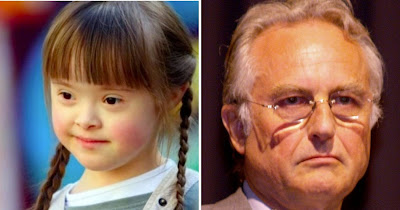Atheist Richard Dawkins Says Abort Disabled Children
Richard Dawkins’ argument against women having babies with Down’s Syndrome is nothing more than eugenics. Dawkins’ warped views don’t recognise disabled people as individuals, instead judging them as burdensome and not worthy of life.
In an interview with the broadcaster Brendan O'Connor of RTE Radio in Ireland, Dawkins attempted to defend how he had responded in 2014 when one of his 2.9 million Twitter followers sent this to him: 'I honestly don't know what I would do if I were pregnant with a kid with Down Syndrome. Real ethical dilemma.'
Dawkins pinged back: 'Abort it and try again. It would be immoral to bring it into the world if you have the choice.'
Fury
Last week, Lynn Murray, whose daughter Rachel has Down's and who runs the Don't Screen Us Out campaign, told a newspaper: 'His publishers should stand with people with Down's Syndrome, uphold their own equality policies and cut ties with the professor, whose uninformed opinions about Down's Syndrome are also out of sync with today's public standards of equality and diversity.'
The petition was signed by one of Scotland's leading columnists, Kevin McKenna, who has a niece with Down's.
The language of 'equality and diversity' is well-judged to rattle Penguin. Even the publishers of J. K. Rowling, the most successful fiction writer of the modern era, were shaken by the fury her allegedly disrespectful remarks about transgender rights aroused among those who claim to represent 'the equalities agenda' (which has replaced class war as the Left's governing principle).
And as big publishing houses have publicly signed up to this agenda, they twitch nervously when the charge of infraction of the doctrine is levelled at them.
Professor Richard Dawkins attempted to defend his response to a Twitter follower who told him she 'didn't know what she would do' if she was pregnant with a child with Down's Syndrome and his advice was: 'Abort it and try again. It would be immoral to bring it into the world if you have the choice'
In fact, Penguin have little to worry about in this case, as the modern campaigning Left regard the unborn child as having no intrinsic moral standing. For them, discrimination against the unborn, or a certain group within that category, is not a thing.
But the publishers might have been squirming a little when their star science writer came up against Brendan O'Connor in early May. For the Irish presenter has a daughter with Down's Syndrome, and when he tested the professor on his now notorious remarks, Dawkins — who insists he bases everything he says on pure reason and empirical knowledge — was exposed as ignorant and ill-informed.
When O'Connor asked him why he regarded it as 'immoral' to knowingly bring a person with Down's into the world, Dawkins replied: 'Given the amount of suffering in the world probably does not go down — probably goes up — compared to having another child who does not have Down's Syndrome, that's what I meant.'
Irish presenter Brendan O'Connor has a daughter with Down’s Syndrome
The presenter queried how Dawkins knew 'it increases the amount of suffering in the world'. Dawkins replied: 'I don't know for certain . . . it seems to me to be plausible that if a child has any kind of disability, you would probably increase the amount of happiness in the world more by having another child instead.'
Asked by O'Connor what his evidence was for that, the professor lamely responded: 'I have no direct evidence, no.'
And when the presenter — with icy calmness telling Dawkins, 'I'm not having an emotional discussion with you here, I'm simply trying a logical discussion' — asked the great empirical thinker if he actually knew anyone with Down's, he admitted he didn't.
If Dawkins had bothered to do any research, he would have come across a peer-reviewed paper in the October 2011 issue of the American Journal of Medical Genetics, which surveyed 300 people with Down's aged 12 and over. It concluded: 'Nearly 99 per cent of people with DS indicated that they were happy with their lives, 97 per cent liked who they are and 96 per cent liked how they looked.'
That's a weird kind of 'suffering'.






